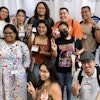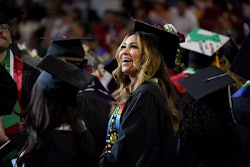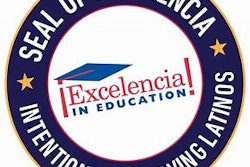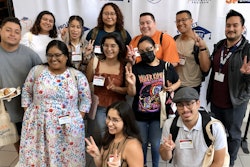New Study Looks at Fragile Futures
Of High-Achieving Latino Students
DAVIS, Calif.
Many high-achieving Latino students miss the opportunity to succeed academically because their needs are poorly understood, according to a new report from ETS and a University of California, Davis researcher. As a result, these students’ academic futures are left “hanging by a thin thread of hope.”
The report “Fragile Futures: Risk and Vulnerability Among Latino High Achievers,” was written by Dr. Patricia Gandara, a professor of education at UC-Davis.
Using two national databases and including personal vignettes of high-achieving Latino students, Gandara’s report demonstrates how high-achieving Latino students’ personal and academic profiles differ from their non-Latino peers, and how these differences can result in academic risk and vulnerability. The report concludes with a series of recommendations including early identification and nurturance
of the strengths of Latino students who are performing well in school.
“The achievement gap is not just a phenomenon that exists at the mid-range of scores,” says Gandara, an expert in minority language instruction and Latino education issues. “It is a significant feature of achievement at the upper score ranges as well. It is imperative that interventions designed to close the achievement gap attend to the needs of the entire academic spectrum of Latino students.”
According to Gandara, factors such as language, culture and immigration status are all issues that can greatly affect these students’ motivation and ultimate achievement. For example, research shows that unlike other high-achieving students, Latinos who demonstrate high academic ability — especially those of Mexican and Puerto Rican ancestry — are not as likely to come from economically and educationally advantaged backgrounds; attend schools that are less likely to offer rigorous curricula and Advanced Placement classes; and have lower percentages of qualified teachers and fewer resources overall.
To address these shortcomings, Gandara recommends:
– Earlier intervention to help identify academic strengths that can be nurtured among students who may not have the resources to reach their potential otherwise.
– Schools building on the strengths that students bring to the classroom, including their home language skills.
– Schools placing special attention on intensive academic-English instruction.
– Schools and programs finding ways to better target and distribute resources to these students.
– Developing special interventions that help these students gain access to rigorous college-preparatory courses and integrating those interventions into schools.
– Providing frank information to both students and parents about the real costs of college, and the various means of financing it; offering information to all Latino students who have demonstrated the ability to gain admission to four-year colleges and universities, and their parents, about the benefits and liabilities of attending nearby, less-demanding institutions.
– Cultivating counselors who come from the same background as their students and who understand and can communicate with the students’ parents.
“Fragile Futures” can be downloaded for free at <www.ets.org/research/pic>.
© Copyright 2005 by DiverseEducation.com















